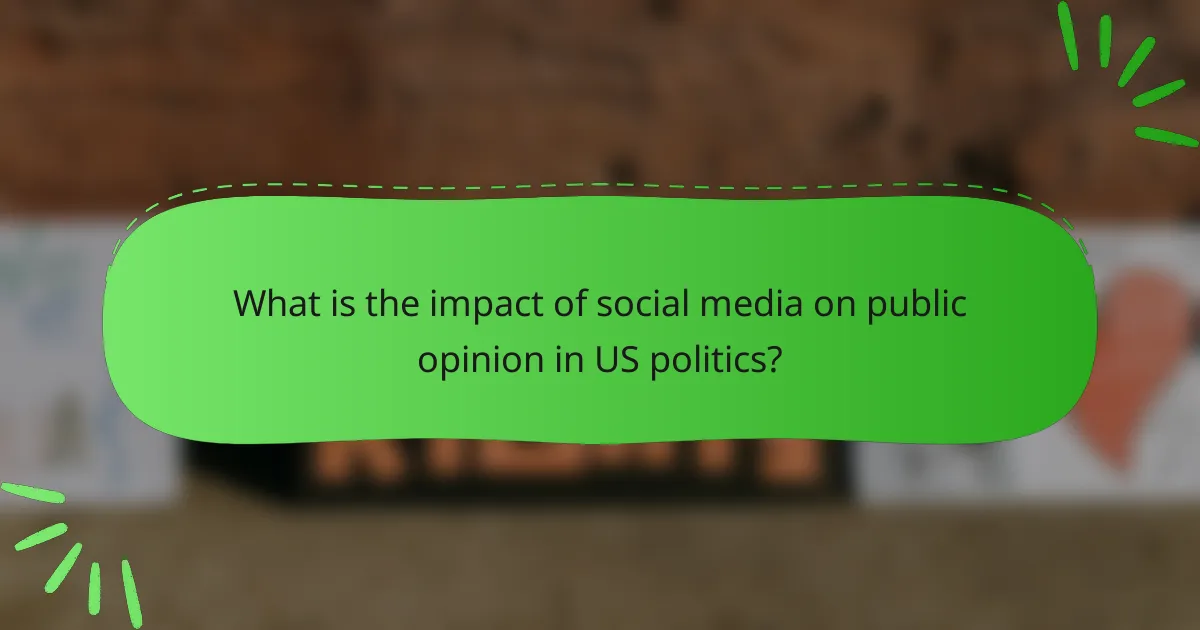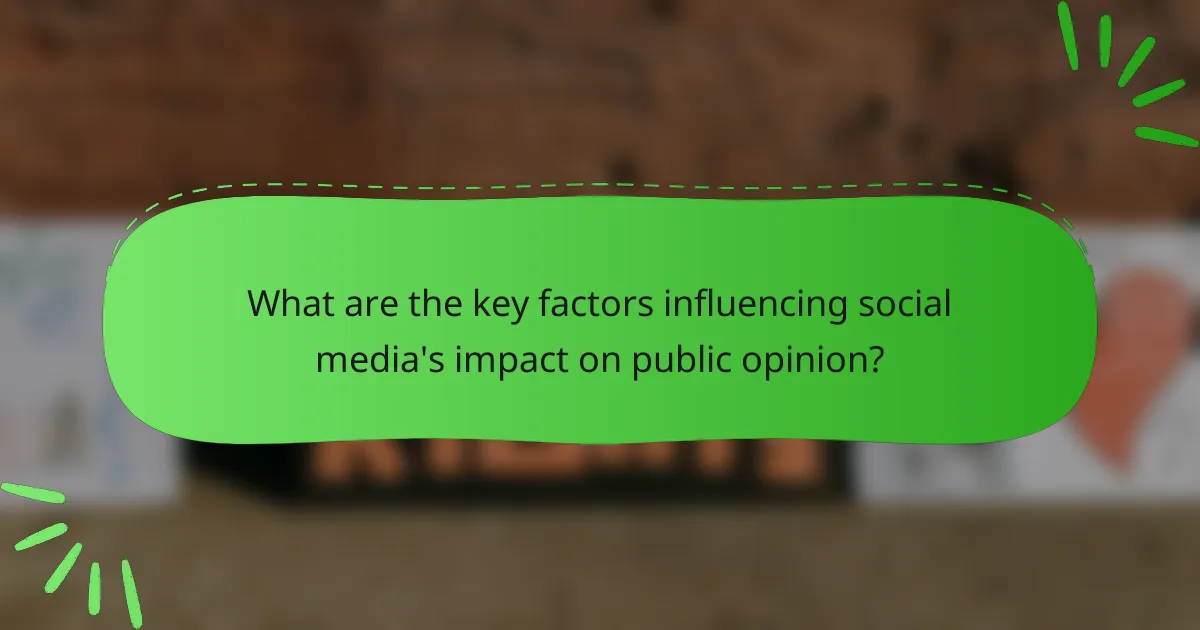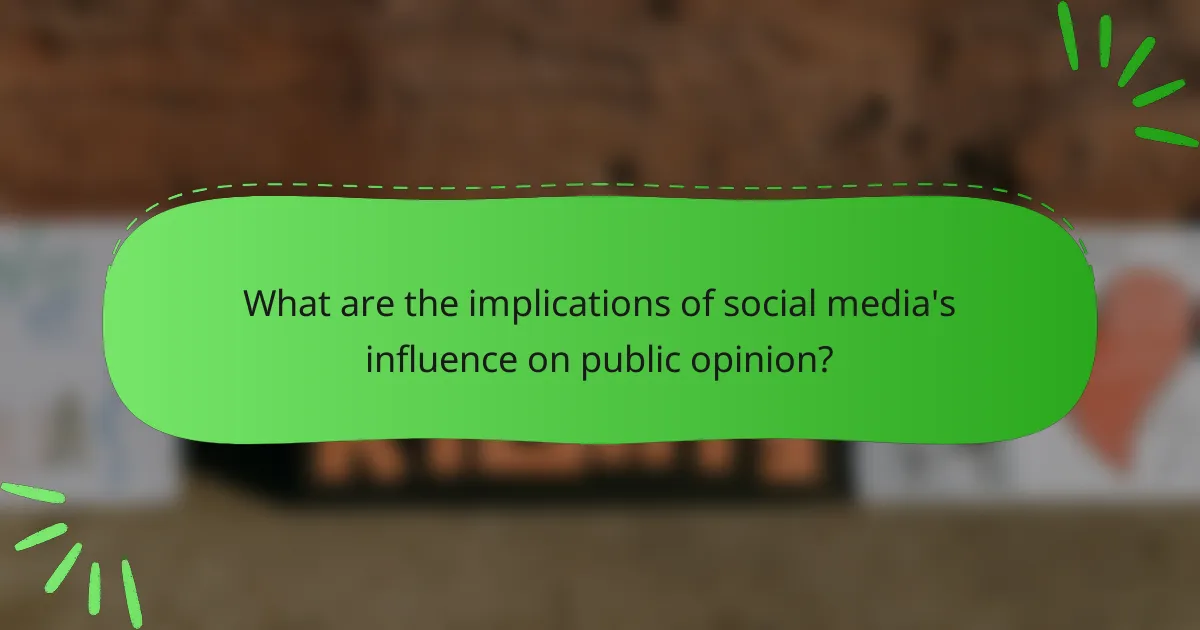Social media is a significant factor influencing public opinion in US politics. It enables rapid information dissemination, allowing users to share news and personal views instantly, which shapes perceptions of political issues. Key elements affecting this influence include user engagement, algorithmic content curation, and the spread of misinformation. Research indicates that a large percentage of Americans rely on social media for news, often leading to the amplification of partisan perspectives and the creation of echo chambers. This dynamic plays a crucial role in shaping political discourse, voter behavior, and overall public sentiment in the United States.

What is the impact of social media on public opinion in US politics?
Social media significantly influences public opinion in US politics. It provides a platform for rapid information dissemination. Users can share news, opinions, and personal views instantly. This immediacy shapes perceptions and attitudes toward political issues. Research indicates that social media can amplify partisan perspectives. According to a 2020 Pew Research study, 55% of Americans get news from social media. This trend affects how individuals understand political events. Social media also enables targeted political advertising, influencing voter behavior. Overall, it plays a crucial role in shaping political discourse and public sentiment.
How has social media changed the landscape of political discourse?
Social media has transformed political discourse by enabling real-time communication and engagement. It allows politicians to directly connect with constituents without traditional media filters. Platforms like Twitter and Facebook facilitate rapid dissemination of information. This immediacy can amplify political messages and mobilize supporters quickly. Social media also enables grassroots movements to gain traction, as seen in campaigns like Black Lives Matter. Additionally, it fosters polarization by creating echo chambers where users encounter only like-minded views. Studies show that social media influences public opinion, shaping perceptions of candidates and issues. For example, a Pew Research Center study found that 62% of Americans get news from social media.
What role do platforms like Twitter and Facebook play in shaping opinions?
Platforms like Twitter and Facebook significantly shape public opinions. They facilitate the rapid dissemination of information and opinions. Users share content that influences their followers and the broader audience. Algorithms prioritize engaging content, amplifying popular views. This can create echo chambers, reinforcing existing beliefs. Studies show social media can sway political views and voter behavior. For instance, a 2018 study by the Pew Research Center found that 64% of Americans believe social media has a major impact on their political opinions. Thus, these platforms play a crucial role in shaping societal discourse and political landscapes.
How do algorithms influence the visibility of political content?
Algorithms determine which political content is prioritized in users’ feeds. They analyze user behavior, engagement, and preferences. Content that generates higher interaction is more likely to be shown. Algorithms also consider factors like recency and relevance. For instance, Facebook’s algorithm promotes posts that align with users’ interests. This can lead to echo chambers, where users see similar viewpoints. A study by the Pew Research Center found that 62% of Americans get news from social media. This highlights the significant role algorithms play in shaping public opinion.
Why is public opinion important in US politics?
Public opinion is crucial in US politics because it influences policy decisions and electoral outcomes. Elected officials often rely on public sentiment to guide their actions. For instance, surveys show that 70% of voters consider public opinion when deciding on legislation. Additionally, public opinion shapes the political agenda by highlighting issues that matter to citizens. Politicians may adjust their platforms based on public feedback to gain support. In elections, candidates use polls to tailor their messages, aiming to resonate with the electorate. This dynamic illustrates the power of public opinion in shaping democratic governance in the United States.
How does public opinion affect policy-making and elections?
Public opinion significantly influences policy-making and elections. Policymakers often consider public sentiment when drafting legislation. Research indicates that elected officials respond to constituents’ views to maintain support. For instance, a 2020 Pew Research study found that 70% of Americans believe their opinions affect government decisions. Additionally, during elections, candidates tailor their messages based on polling data to align with voter preferences. This responsiveness shapes campaign strategies and ultimately impacts election outcomes.
What methods are used to measure public opinion?
Surveys and polls are the primary methods used to measure public opinion. Surveys gather responses from a sample of individuals about their beliefs and attitudes. Polls often focus on specific questions regarding political preferences or social issues. Both methods can be conducted via telephone, online platforms, or face-to-face interviews.
Statistical sampling techniques ensure that survey results are representative of the larger population. For instance, Gallup and Pew Research Center frequently conduct polls to gauge public sentiment on various topics. Their findings are widely referenced in political analysis and media reports.
Additionally, focus groups provide qualitative insights into public opinion. They involve guided discussions with a small group of individuals to explore their perceptions in depth. Content analysis of social media platforms also serves as a modern method, analyzing trends and sentiments expressed online.
These methods collectively contribute to understanding how social media influences public opinion in US politics.

What are the key factors influencing social media’s impact on public opinion?
Key factors influencing social media’s impact on public opinion include user engagement, algorithmic content curation, and the spread of misinformation. User engagement shapes public perception through likes, shares, and comments. High engagement can amplify certain viewpoints, leading to a skewed understanding of issues. Algorithmic content curation prioritizes content based on user preferences, often creating echo chambers. This can limit exposure to diverse perspectives. The spread of misinformation further complicates public opinion. Studies show that false information spreads faster than the truth on social media platforms. This can lead to distorted views on political topics. Together, these factors significantly shape how public opinion is formed and influenced in US politics.
How do demographic factors affect social media engagement in politics?
Demographic factors significantly influence social media engagement in politics. Age, gender, ethnicity, and education level shape how individuals interact with political content online. Younger users, particularly those aged 18-29, are more active on platforms like Twitter and Instagram. Research from the Pew Research Center indicates that 84% of younger adults use social media for political information.
Gender also plays a role; women tend to engage in political discussions more than men on platforms like Facebook. Ethnic diversity affects engagement levels as well. For example, Hispanic and Black users are more likely to use social media for political mobilization compared to their White counterparts.
Education level impacts engagement; individuals with higher education are more likely to share and discuss political content online. This demographic variation leads to differing levels of political participation and influence on social media platforms.
What role does age play in social media usage for political information?
Age significantly influences social media usage for political information. Younger individuals, particularly those aged 18 to 29, are more likely to utilize platforms like Twitter and Instagram for political news. In contrast, older adults, especially those over 50, tend to prefer Facebook and traditional news sources. A study by the Pew Research Center in 2021 found that 70% of younger users rely on social media for political information, compared to only 30% of older users. This generational divide affects how political messages are received and shared. Younger users often engage in more interactive forms of political discourse online. Meanwhile, older users may focus on passive consumption of political content. The differences in platform preference highlight the varying ways age groups interact with political information.
How does education level influence political discussions on social media?
Education level significantly influences political discussions on social media. Individuals with higher education levels tend to engage more in political discourse online. They often have better access to information and analytical skills. This allows them to articulate their views more effectively. Research shows that educated users are more likely to share political content. A study by Pew Research Center found that 65% of college graduates engage in political discussions on social media. In contrast, only 45% of those with a high school diploma do the same. Higher education correlates with increased political awareness and participation. This dynamic shapes the overall tone and quality of political discussions on these platforms.
What psychological factors contribute to social media’s effect on political opinions?
Psychological factors that contribute to social media’s effect on political opinions include confirmation bias, social identity, and the influence of echo chambers. Confirmation bias leads individuals to seek information that aligns with their pre-existing beliefs. This bias reinforces political opinions as users engage with content that validates their views. Social identity plays a role as individuals align their opinions with those of their peer groups. This alignment fosters a sense of belonging and can lead to polarized views. Echo chambers further amplify these effects by limiting exposure to diverse perspectives. Research indicates that users are more likely to share content that resonates with their beliefs, creating feedback loops that solidify opinions. Studies show that social media can exacerbate polarization by promoting extreme viewpoints. These psychological factors collectively shape how individuals perceive and engage with political content online.
How does confirmation bias manifest in social media interactions?
Confirmation bias manifests in social media interactions by users favoring information that aligns with their preexisting beliefs. This behavior leads individuals to engage more with content that confirms their views while ignoring contradictory information. Social media algorithms often amplify this effect by curating feeds based on user interactions. A study by Bakshy et al. (2015) found that Facebook users were more likely to share articles that matched their political leanings. This selective exposure reinforces echo chambers, where users are only exposed to like-minded opinions. Consequently, confirmation bias can distort public discourse and influence political polarization.
What impact does social media echo chambers have on political polarization?
Social media echo chambers significantly contribute to political polarization. These echo chambers reinforce existing beliefs by limiting exposure to diverse viewpoints. Individuals within these spaces often engage with like-minded users. This interaction intensifies their biases and strengthens their political identities. Research indicates that users in echo chambers are less likely to encounter opposing opinions. A 2018 study by the Pew Research Center found that 68% of social media users reported seeing mostly like-minded content. This environment fosters an “us vs. them” mentality. Consequently, political discourse becomes more divisive and extreme.

What are the implications of social media’s influence on public opinion?
Social media significantly shapes public opinion by facilitating the rapid dissemination of information. It allows users to share news, opinions, and experiences instantly. This immediacy can amplify certain viewpoints while marginalizing others. Algorithms often prioritize sensational content, influencing what users see. Research indicates that 64% of Americans believe social media influences their views on political issues. Social media also fosters echo chambers, where users engage primarily with like-minded individuals. This can reinforce existing beliefs and polarize public discourse. The influence of social media on public opinion is profound and multifaceted, affecting political engagement and voter behavior in the U.S.
How does misinformation spread on social media platforms?
Misinformation spreads on social media platforms primarily through user engagement and algorithmic amplification. Users share misleading content, often without verifying its accuracy. This sharing creates a network effect, where misinformation reaches a wider audience quickly. Algorithms prioritize content that generates high engagement, regardless of its truthfulness. Studies show that false information spreads faster than true information on these platforms. A 2018 study by Vosoughi, Roy, and Aral found that false news stories are 70% more likely to be retweeted than true stories. Emotional content, especially fear-inducing posts, also contributes to rapid dissemination. As users interact with misleading information, it further entrench their beliefs and biases.
What are the consequences of misinformation for political campaigns?
Misinformation in political campaigns can lead to significant consequences. It can distort public perception and influence voter behavior. Misinformation can create confusion about candidates and their policies. This confusion may result in voters making uninformed decisions. Studies have shown that misinformation can sway election outcomes. For instance, a 2020 study by Vosoughi, Roy, and Aral found that false news spreads faster and reaches more people than true news. This rapid spread can undermine trust in the electoral process. Additionally, misinformation can polarize communities and deepen societal divides. These consequences highlight the critical need for accurate information in political discourse.
How can users identify and combat misinformation online?
Users can identify and combat misinformation online by verifying sources and cross-referencing information. Fact-checking websites like Snopes and FactCheck.org provide reliable verification. Users should scrutinize the credibility of the source before sharing information. Analyzing the author’s background and the publication’s reputation is essential. Users can also look for citations and evidence supporting claims. Misinformation often lacks reliable sources or references. Engaging in critical thinking helps users assess the validity of information. Education on recognizing misinformation is crucial for informed decision-making. Studies show that media literacy improves the ability to discern accurate information from falsehoods.
What strategies can political entities use to leverage social media effectively?
Political entities can leverage social media effectively by employing targeted advertising. This strategy allows them to reach specific demographics with tailored messages. Additionally, engaging with followers through interactive content fosters community and loyalty. Regular updates on policies and events keep the audience informed and involved. Utilizing analytics tools helps track engagement and adjust strategies accordingly. Collaborating with influencers can amplify their message and reach broader audiences. Furthermore, transparency in communication builds trust with constituents. According to a Pew Research Center study, 69% of Americans use social media, highlighting its importance in modern political engagement.
How can political campaigns utilize social media for outreach?
Political campaigns can utilize social media for outreach by engaging directly with voters. They can share information about their platforms and policies through posts and videos. Targeted ads help reach specific demographic groups effectively. Campaigns can also create events and encourage participation through social media channels. Real-time interaction with supporters builds community and fosters loyalty. Data analytics on social media engagement informs campaign strategies. According to a Pew Research study, 69% of adults in the U.S. use social media, highlighting its potential reach. These strategies optimize voter engagement and increase campaign visibility.
What best practices should be followed for engaging with voters online?
Engaging with voters online requires transparency, authenticity, and responsiveness. Clear communication fosters trust between candidates and voters. Regular updates on policies and events keep voters informed. Utilizing multiple platforms enhances reach and engagement. Visual content, such as videos and infographics, increases interaction rates. Encouraging feedback and discussions helps build community. Personalizing messages can significantly improve voter connection. Data shows that campaigns using these practices see higher voter engagement and turnout.
What future trends can we expect in social media and public opinion?
Future trends in social media and public opinion include increased personalization and algorithm-driven content. Social media platforms will likely enhance user data analytics to tailor content to individual preferences. This trend can lead to echo chambers, where users are exposed primarily to viewpoints similar to their own. Additionally, the rise of short-form video content will shape public discourse. Platforms like TikTok are already influencing political messaging and engagement.
Moreover, we may see a greater emphasis on transparency regarding misinformation. Social media companies are under pressure to address false information effectively. The integration of augmented reality and virtual reality may also transform user interactions and perceptions. These technologies could create immersive experiences that influence public opinion in new ways.
Finally, the role of influencers in shaping political narratives is expected to grow. Influencers will increasingly engage audiences on political issues, impacting public sentiment. These trends collectively signal a dynamic future for social media’s role in shaping public opinion in US politics.
How might emerging technologies change social media’s role in politics?
Emerging technologies will likely enhance social media’s role in politics by enabling more personalized and targeted communication. Advanced algorithms can analyze user data to tailor political messages to individual preferences. This leads to increased engagement and the potential for echo chambers. Moreover, technologies like artificial intelligence can automate content creation and dissemination, allowing for rapid response to political events. Blockchain technology may enhance transparency in political funding and campaign contributions. These changes could influence voter behavior and public opinion significantly. For instance, a study by the Pew Research Center found that 69% of adults in the U.S. get news from social media, highlighting its growing political influence.
What are the potential risks and benefits of these changes?
The potential risks of changes in social media’s impact on public opinion in US politics include misinformation and polarization. Misinformation can spread rapidly, leading to distorted perceptions of political issues. Polarization may increase as users engage primarily with like-minded individuals, creating echo chambers.
The benefits of these changes include enhanced political engagement and increased access to diverse viewpoints. Social media platforms facilitate discussions and mobilize users around political causes. They also provide a space for underrepresented voices, enhancing democratic participation.
Research from the Pew Research Center indicates that 69% of adults in the US use social media, highlighting its significant role in shaping public opinion.
The main entity of the article is social media and its impact on public opinion in US politics. The article examines how social media platforms influence political discourse, shape public sentiment, and affect policy-making and elections through rapid information dissemination, targeted advertising, and user engagement. It highlights the role of algorithms in curating content, the spread of misinformation, and demographic factors influencing political engagement. Additionally, the article discusses the psychological aspects of social media interactions and the implications of these dynamics for future political communication and public opinion trends.